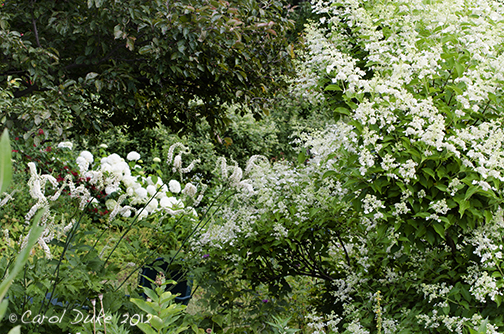The second installment of Butterflies of 2012 features three members of the Papilionidae family.
Swallowtails regularly make their home in our gardens and fields and seeing their wings lit up like stained glass floating about the plants is always a delight.
Last year was very exciting for a rare sighting of a Giant Swallowtail, Papilio cresphontes here at Flower Hill Farm. Butterfly enthusiasts from all over Massachusetts were reporting first time ever sightings of the magnificent giants. Climate change will no doubt bring about more joyous encounters with these beauties to our northern gardens. Though a few sightings had been reported since 2009, last years sightings were record breaking.
The giant was difficult to photograph as it rarely stops fluttering.
It is surprising to see the Giant Swallowtail's brown and yellow coloring when the wings are wide open. At a glance a giant might be mistaken for a male Black Swallowtail, Papilio polyxenes or Eastern Tiger Swallowtail, Papilio glaucus. Upon closer observation you can see the Giant Swallowtail is quite different in color and pattern. I had never seen one before and did not identify the giant immediately but knew it was different from any butterfly I had ever seen here at Flower Hill Farm. The Giant Swallowtail's larger size is very obvious, though size is not clearly illustrated in the photo above due to the Black Swallowtail and Eastern Tiger Swallowtail below being zoomed in on.
A male Black Swallowtail from 2011.
A female Black Swallowtail from 2012.
Female Eastern Tiger Swallowtail from 2011 to show full pattern for comparison.
Eastern Tiger Swallowtails flit about the gardens in numbers especially when the lilacs are in bloom. Unfortunately for them, it is a peak feeding time for baby birds too. Luckily tigers are in abundance so birds are not a great threat, but it is hard to see them being persistently pursued by Catbirds and Chickadees. Often tiger wings are tattered, so to find a fresh and perfect butterfly is a lucky sighting in our gardens.
Folded wings offer other patterns and colors to help identify these three Swallowtail cousins.
A quiet second from fluttering for this gorgeous backlit Giant Swallowtail.
In twenty-twelve I had the joy of raising and releasing this Black Swallowtail into the gardens. I have raised hundreds of Monarch Butterflies over the years but this was only my second experience raising a Black Swallowtail.
Strikingly patterned Swallowtail butterflies grace our world throughout the summer months and add another dimension of enchantment to the gardens and fields. Of course, beyond human enjoyment, all butterflies are important pollinators, and being near the bottom of the food chain, they are, sadly, important food for birds.
By clicking on the words highlighted in red above you can learn more about these Swallowtails.
Now, in the middle of a snowstorm, I so look forward to another year of enjoying the gardens and butterflies.
In honor of my fourth anniversary of blogging, I have given the blog a facelift and added a search bar so that readers can now type in an item of interest and articles will appear at the top of the screen.

































